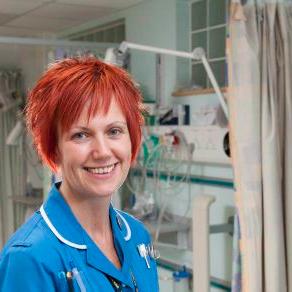
Christina Bannister
Wednesday 6th April 2016
Chrissie lives in Winchester. When she’s not busy working as a nurse at Southampton General, she’s spending time with her kids or out on the water as a trainee sailor! Here, she shares her experience working as a cardiac nurse, and talks about the advice she would give to patients and their families.
I have worked in cardiac surgery for the past 22 years, first on a cardiac surgery and cardiology ward, progressing to my current specialist nursing role. I worked in a couple of hospital in London before moving to Southampton General 8 years ago. My current role consists of planning the caseload for Mr Steve Livesey, a cardiac surgeon specialising in mitral valve disease.
In addition, I am also the Nursing & Allied Health Professional Representative for the Society for Cardiothoracic Surgery in Great Britain & Ireland, Nursing Representative for the National Cardiac Benchmarking Collaborative and have sat on the cardiac surgery Clinical Reference Group for NHS England.
At Southampton, my main work environment is within the pre-operative care of both elective and non-elective patients, i.e. those coming from home on the waiting list and also those being admitted as an urgent case from another hospital. I pre-assess patients prior to their cardiac surgery in the outpatient clinic and provide all pre-operative information and workup for the patient and their family. I work within a team of five Nurse Case Managers and we plan the surgical dates for the patients on the cardiac surgical waiting list and the inpatient transfers.
For any young person wanting to work in this cardiac nursing sector, you need to have a passion for the role. The ability to work hard, and communicate with people from all sections of society, is also crucial as you’re working with a huge variety of people and personalities.
The changing patient landscape
The patients we see in the cardiac surgery clinic have changed over the past 20 years. The patients we offer surgery to have become older, frailer and have more co-morbidities (one or more additional illness happening at the same time). We routinely offer valve surgery to patients in their late 80s and now their 90s. We recently operated on a lady in her 90s; although she was elderly she had a fantastic positive attitude to life and wished to be able to get back on her bicycle and cycle along the coast every day. Her surgery was successful and she was discharged with a short length of stay in hospital. Her attitude to her surgery and subsequent recovery amazed me; it showed that with a strong determination to recover and get back to full fitness, she was back to doing her normal daily activities quickly.
There is a section of the population who have an increased awareness of heart valve disease because of internet resources available now. With this increasing internet usage of come discrepancies in what patients are told and what they read. A charity such as Heart Valve Voice, with sound, medically-approved information is of benefit, as patients and their families can ensure that the information they read is correct. It’s very important that patients and their families take responsibility for the health and lifestyles. With increased knowledge of heart valve disease and how to manage it, patients and their relatives can control their everyday living and help maintain a healthy status.
Websites such as Heart Valve Voice are good as patients benefit from the support of other patients with valve disease; both long term and in the pre- and post-operative stages. Often cardiac patients are followed up for a long time by a cardiology team before they are referred for treatment, and therefore increased information from a variety of sources enables patients to manage their lifestyle and symptoms. It’s also useful for families, who often need as much support as the individual with heart valve disease, especially dealing with a long-standing health condition and prior to planning surgery.
What are patients' main concerns before surgery, and what advice would you give at this time?
Before heart valve surgery, patients main concerns are with the entire inpatient process and post-operative care at home following the operation. Patients often have major concerns about dental assessments and subsequent work needed prior to surgery. For younger patients, caring for their children and work issues are also major worries; patients often do not inform their workplace as they are concerned they may be made redundant, which obviously does not enable their employers to help them lessen their workload prior to the surgery and cover their work again post –procedure.
Most patients worry about their symptoms, and the progression of these. We provide information about medications and signs and symptoms to be aware of to identify the worsening of their condition. Some heart valve patients have no symptoms and feel well; these patients worry that surgery may not be the best way forward. Although medical professionals normally treat patients based on their symptoms as opposed to a test, heart valve disease is an exception to the rule. Even without symptoms, if the echocardiogram result shows the heart is deteriorating with worsening valve disease, surgery should be discussed.
My advice to patients preparing for heart valve disease treatment is to keep as healthy as possible, and away from others with colds etc. so that their procedure is not cancelled if they are unfit. We advise patients to prepare for their admission to hospital, to bring in some books and magazines to occupy them whilst in hospital, as well as some healthy drinks and snacks that they like.
What are family members main concerns prior to treatment, and what advice would you give at this time?
Family members are often concerned about how to care for their relative post-surgery. Although it is important for the patient to look after their sternotomy (breastbone incision) wound, like a ‘broken bone’, it is key that they remain active to prevent complications from occurring. We would advise the family to support the patient, go for walks with them and ensure they have a quiet time so that they are able to rest when necessary. The best way is to ensure that there is a family member available to help and support the patient post-surgery once they are discharge home. Although no nursing care will be needed, it will be important for someone to be around, especially at night, and also to help with cooking, cleaning, shopping and driving etc. Stocking up the cupboards and freezer will help the post-surgery period. Emotionally, a good network of support will enable the patient to recover fully and to reduce their anxiety.
What is your advice for the aftercare process?
For patients living alone or who have no-one that can care for them after treatment, pre-operative discharge planning is key; we advise patients to have someone with them for the first two weeks post discharge to help them. In addition we advise these patients to make sure they have meals in their freezers and milk etc. as any pre-operative planning will help with the post-operative care. For younger patients, their main concerns often are related to caring for their families and work related issues. Again we encourage them to have a supportive family member with them, especially to help look after young children. Patients will need at least 6-8 weeks off work after surgery and we encourage them to go back slowly and build up their working hours.
The DVLA states that patients may not drive for 4weeks post surgery, and we normally advise patients to extend this to 6 weeks or after their initial follow-up appointment. This causes worries to the patient, especially if they are the only driver in the family. It is very important not to drive too early as the patient will need the sternum to be healed properly and be able to do an emergency stop without pain.
We give the same advice to the patient and their families, but we also encourage families to limit the time they visit to ensure that the patient has an appropriate time to rest. Often relatives and friends are well meaning and want to visit to check the patient is OK post surgery, but this needs to be limited to prevent the patient from becoming exhausted and overwhelmed.
Issues after treatment
Most patients have a relatively smooth post-operative recovery. Wounds should be checked for signs of redness, swelling and any oozing/bleeding. If there are any signs of complications such as palpitations (a racing heart sensation) or shortness of breath, the GP should be the first contact for assistance and further information. In the long-term, the patients will be followed-up by their referring cardiologist so they will give advice on long term health management and monitoring. Also long-term patients will need to ensure they have good dental health, therefore preventing the risk of endocarditis (infection of the inner lining of the heart).


